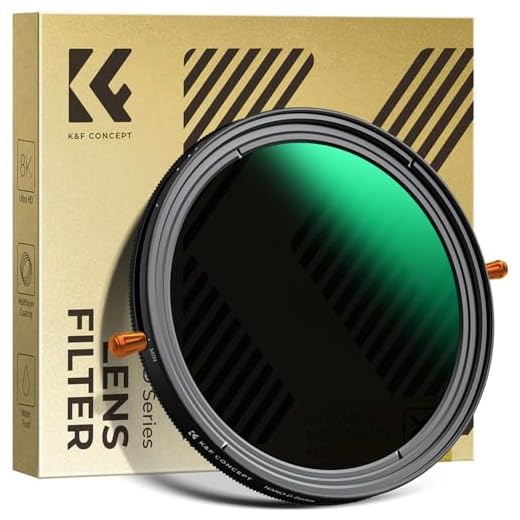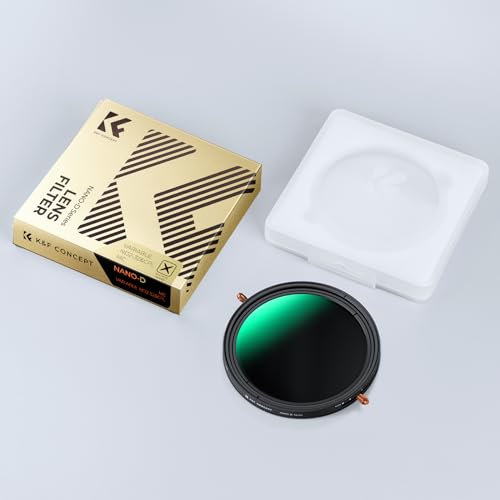



As a passionate photographer, I am always on the lookout for ways to enhance the quality and creativity of my images. One essential tool in my photography arsenal is the DSLR camera lens filter. These small but mighty accessories can make a big difference in the final outcome of your photos, whether you’re shooting landscapes, portraits, or macro shots.
With a wide range of filters available on the market, it can be overwhelming to choose the best one for your needs. From UV filters for lens protection to polarizing filters for reducing glare and enhancing colors, each type has its unique benefits. In this article, I will guide you through the world of DSLR camera lens filters, helping you understand their functions and how they can elevate your photography.
Join me on a journey to discover the top DSLR camera lens filters that every photographer should consider adding to their gear collection. From neutral density filters for long exposure shots to graduated filters for balancing exposure in challenging lighting conditions, these tools are essential for capturing stunning images that stand out from the rest.
My Choice of DSLR Camera Lens Filters
As a passionate photographer, I have experimented with various DSLR camera lens filters to enhance the quality of my shots. One of my favorite filters is the circular polarizer, which helps reduce reflections and glare, resulting in vibrant colors and improved contrast in my images.
Another must-have filter in my collection is the neutral density filter, which allows me to control the amount of light entering the lens, enabling me to achieve long exposure shots even in bright daylight. This filter is essential for capturing silky smooth waterfalls or streaking clouds in landscape photography.
My Top 3 DSLR Camera Lens Filters:
- Circular Polarizer Filter: Enhances colors and reduces glare.
- Neutral Density Filter: Controls light for long exposure shots.
- UV Filter: Protects the lens from dust, moisture, and scratches.
UV Filters
UV filters are essential accessories for DSLR camera lenses as they provide protection against harmful ultraviolet rays. These filters help reduce haze and improve image clarity, making them ideal for outdoor photography.
UV filters are transparent and do not affect the colour balance of your images. They are easy to screw onto the front of your lens and offer an extra layer of protection against dust, moisture, and scratches.
- Benefits: Protection against UV rays, improved image clarity
- Features: Transparent, easy to attach, extra layer of protection
- Usage: Ideal for outdoor photography, reduces haze
Circular Polarizing Filters
When it comes to enhancing the quality of your photographs, circular polarizing filters are a must-have accessory for any serious photographer. These filters are designed to reduce glare and reflections, resulting in vibrant, more saturated colours and improved contrast in your images.
One of the key benefits of circular polarizing filters is their ability to enhance the clarity of skies, making them appear deeper blue and clouds more defined. They are also ideal for shooting through glass or water, as they help eliminate reflections and allow you to capture clear, distortion-free images.
- Enhances colour saturation and contrast
- Reduces glare and reflections
- Improves clarity of skies and water
- Eliminates reflections when shooting through glass
Exploring Neutral Density Filters for DSLR Camera Lenses
When it comes to enhancing photography with DSLR camera lenses, one of the key tools that can make a significant difference is a neutral density filter. These filters are designed to reduce the amount of light entering the lens without affecting the color balance, allowing for greater control over exposure settings.
Personally, I have found that using neutral density filters opens up new creative possibilities, especially when shooting in bright conditions or when aiming for long-exposure effects. By selecting the right density level for the filter, I can achieve the desired effect without compromising image quality.
Key Benefits of Neutral Density Filters:
- Control over exposure settings in bright conditions
- Ability to achieve long-exposure effects
- No impact on color balance
Graduated ND Filters
When it comes to landscape photography, Graduated ND (Neutral Density) filters are essential for achieving balanced exposure in challenging lighting conditions. These filters are designed to reduce the intensity of light in specific areas of the image, allowing you to capture a scene with a wide dynamic range without overexposing the highlights or underexposing the shadows.
One of the key advantages of Graduated ND filters is their versatility. By using a filter that transitions from dark to clear gradually, you can easily adapt to different lighting situations and create stunning images with well-balanced exposure. Whether you’re shooting a sunrise or a sunset, these filters help you capture the beauty of the scene in all its glory.
- Types of Graduated ND Filters:
- Hard-edge Graduated ND Filters
- Soft-edge Graduated ND Filters
- Reverse Graduated ND Filters
Color Filters
One essential type of lens filter for DSLR cameras is color filters. These filters come in various colours, such as red, blue, green, and yellow, and can be used to enhance or modify the colours in your photographs. Color filters are particularly useful for landscape photography, where they can help bring out the vibrant colours of a sunset or make a blue sky even more intense.
When using color filters, it’s important to understand how they work with different lighting conditions. For example, a red filter can enhance warm tones in a sunset, while a blue filter can make a cloudy sky appear more dramatic. Experimenting with different color filters can help you achieve the desired effect in your images.
- Red Filter: Enhances warm tones, particularly useful for sunsets and sunrises.
- Blue Filter: Creates a cooler tone, ideal for enhancing blue skies and water.
- Green Filter: Enhances green foliage and can make landscapes appear more vibrant.
- Yellow Filter: Helps improve contrast and can enhance the details in black and white photography.
Infrared Filters
When it comes to exploring the world of infrared photography, having the right filter can make all the difference. Infrared filters are designed to block visible light while allowing infrared light to pass through, resulting in striking and unique images.
One of the key advantages of using an infrared filter is the ability to capture a different perspective of the world around you. By filtering out visible light, these filters can reveal hidden details and textures that are not visible to the naked eye, creating surreal and otherworldly images.
- Types of Infrared Filters: There are various types of infrared filters available, each with its own unique characteristics and effects. Some popular options include IR pass filters, IR cut filters, and full-spectrum filters.
- Choosing the Right Filter: When selecting an infrared filter, it’s essential to consider factors such as the wavelength range, filter size, and compatibility with your camera lens. Experimenting with different filters can help you achieve the desired results and unleash your creativity in the world of infrared photography.
Macro Filters
When it comes to capturing intricate details and close-up shots, macro photography is a popular choice among photographers. Macro filters are essential tools that can help enhance your macro photography by allowing you to focus on subjects at a very close range.
Macro filters come in various strengths, typically measured in diopters, which indicate the level of magnification they provide. These filters can be easily screwed onto the front of your camera lens, enabling you to achieve stunning close-up shots without the need for dedicated macro lenses.
- Increased Magnification: Macro filters allow you to magnify your subject, bringing out fine details and textures that may not be visible to the naked eye.
- Convenience: With macro filters, you can easily switch between regular and close-up shots without having to swap lenses, making them a convenient and portable option for macro photography on the go.
- Affordability: Compared to dedicated macro lenses, macro filters are a cost-effective alternative that can still deliver impressive results, making them a great option for photographers on a budget.
Fader ND Filters
When it comes to controlling the amount of light entering your DSLR camera, Fader ND filters are an essential tool for photographers. These filters allow you to smoothly adjust the intensity of light without changing the color balance of your images, making them ideal for capturing long exposure shots or shooting in bright conditions.
With a Fader ND filter, you can easily dial in the desired level of light reduction by simply rotating the filter, giving you the flexibility to fine-tune your exposure settings on the go. This makes them a versatile option for photographers who need to quickly adapt to changing lighting conditions while shooting.
- Smooth Light Control: Fader ND filters provide seamless adjustment of light intensity without affecting color balance.
- Convenient Exposure Adjustment: By rotating the filter, you can easily control the amount of light entering your camera, allowing for quick exposure adjustments.
- Versatile Shooting Options: Fader ND filters are ideal for capturing long exposure shots or shooting in bright conditions, giving you greater creative freedom.
Specialty Filters
Aside from the standard UV, CPL, and ND filters, there are specialty filters available for specific creative effects and applications. These filters can add unique and artistic elements to your photographs, enhancing your creativity and expanding your photographic capabilities.
Summary:
- Macro Filters: These filters allow you to capture close-up shots with enhanced magnification, perfect for detailed shots of small subjects like insects, flowers, and textures.
- Color Filters: Color filters can add a tint or color cast to your images, creating mood or enhancing specific tones in your photos.
- Star Filters: Star filters create a starburst effect around bright light sources, adding a magical and dreamy quality to your photos.
- Soft Focus Filters: These filters produce a soft and dreamy look by diffusing light and reducing sharpness, ideal for creating a romantic or ethereal atmosphere in your images.
- Neutral Density Graduated Filters: ND graduated filters help balance exposure in high-contrast scenes by darkening the brighter areas of the image, allowing you to capture a well-exposed shot with detail in both highlights and shadows.
Best dslr camera lens filters
Features
| Part Number | A-NXTPL77UV |
| Model | A-NXTPL77UV |
| Color | UV |
| Size | 77 mm |
Features
| Part Number | KF01.973V1 |
| Model | KF01.973 |
| Color | Circular Polarizer |
| Size | 77mm |
Features
| Part Number | Y1IR72077 |
| Model | Y1IR72077 |
| Color | Black |
| Release Date | 2009-03-23T00:00:01Z |
| Size | 77 mm |
| Language | English |
Features
| Part Number | AU-KF01.2405 |
| Model | AU-KF01.2405 |
| Size | 67mm |
Q&A:
What are the best dslr camera lens filters?
Some popular dslr camera lens filters include UV filters, polarizing filters, and neutral density filters. UV filters are used to reduce haze and protect the lens, polarizing filters help reduce reflections and enhance colours, while neutral density filters allow you to control the amount of light entering the lens.
How do I choose the right dslr camera lens filter?
When choosing a dslr camera lens filter, consider the type of photography you do and the effect you want to achieve. UV filters are great for protecting the lens and reducing haze, polarizing filters are ideal for landscape photography to enhance colours and reduce reflections, and neutral density filters are useful for long exposure shots or when you want to control the amount of light entering the lens.

























